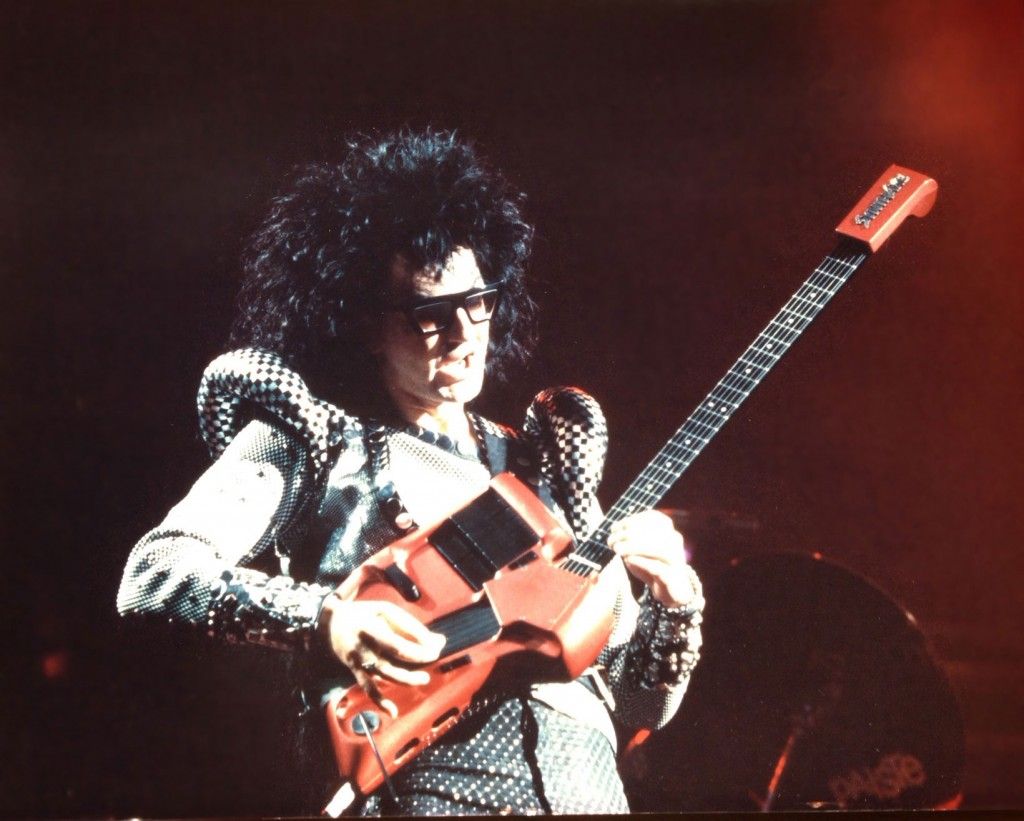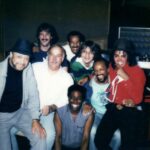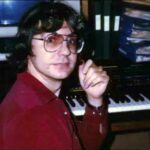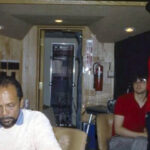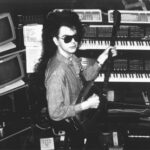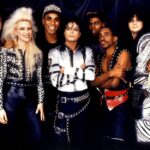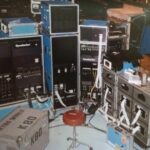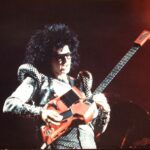In 1987, I discovered Michael Jackson with the Bad album. It is easy therefore to figure out the personal bond that I have with this record. More generally speaking, it marked the last collaboration between MJ and Quincy Jones (following both the Off The Wall and the Thriller albums) which makes the topic all the more interesting to discuss, especially when doing it with Christopher Currell, one of the major collaborative partners on Bad, who agreed to answer my questions. This gave us the opportunity to evoke his bond with Michael Jackson and the Bad Tour, but also the Synclavier that shaped the sound of that fabulous record!
First of all, can you start by telling us how you grew a passion for music and eventually made a career out of it ?
Actually, I started being interested in music at Junior High School, mainly because I saw some of the students playing in a band at a dance. It was the first time I had seen a live band and it seemed really cool to me! The sounds were really amazing to me and I also saw how it attracted people. It was quite an interesting exchange between the music and the people dancing. I thought it was very interesting, especially the guitar sound, and I told my parents I wanted to play the guitar. So we went to a little music store and signed up for some lessons. I got a little guitar and an amplifier and I started taking lessons. But I was learning really stupid songs like “Mary Had a Little Lamb“ and I couldn’t stand it! I wanted to play the current songs on the radio! I was more interested in just experimenting with chords and after a few lessons I dropped out of that. So for a while I didn’t have a guitar but then I kept bugging my parents and asking for a guitar so finally they got me an electric guitar. I didn’t have an amplifier for a while either but my cousin had one so he gave it to me. And I just started playing – I must have been 15 years old at that time.
How did you discover the Synclavier and when you play it, do you feel as a technician or a musician?
Both. I literally switch back and forth – one moment I’m a musician and the next moment I’m a technician. I did this for so many years I got really good at it. Some people can’t do it or it takes them a long time to make that switch but I can do it like in a snap of a finger. I think it’s just because of the millions of hours of doing it.
I discovered the Synclavier at the Audio Engineering Convention in Los Angeles. A similar instrument to this was the Fairlight and I was aware of this first. I thought « Wow ! » because this was really new stuff where you could record sounds and create musical instruments on the keyboard by sampling. That’s what digital synthesis can do – it’s actually creating music using a computer. I thought it was really cool! The Fairlight had a light pen and you could draw audio waveforms directly on the computer screen so these were really advanced things back then. The Synclavier came out at about the same time. While the Fairlight was made by an Australian company, the Synclavier came from America and when I heard it, it just sounded better to me. It didn’t even have sampling at the time, it was just synthesis but it sounded better. I was very intrigued and I started studying more and more about it since they kept updating it. At the time I was just a poor musician and I could barely afford my rent but I spent my last little bit of money on the manual for the Synclavier which was really thick like a phone book and I started studying it. I met with the Los Angeles representatives many times – I saw the machine and I could touch it and play with it. The actual West Coast distributor, Denny Jaeger, lived in San Francisco so I got to know him and I wanted to buy a Synclavier but it was really expensive. So I tried to get bank loans or get sponsors, and I would go through all the paperwork and went to all sorts of meetings, but in the end, I was always rejected. Each time I would do this I would have to talk to Denny and this went on for two years! I got really frustrated because it seemed like I was running out of ways to finance this machine.
Finally, Denny said, “You really want one of these, don’t you ? I just happen to have an extra one in my closet!“ I said, “What?!?“ And he added, “I will sell it to you on time – you don’t have to go through the bank or anything like that. If you can’t make the payments, just send it back to me.“ So he sent the whole machine back to the factory to make sure that everything was working correctly and that’s how I got started. Of course, I made all the payments and I started doing sessions with it. Very quickly, I got very good with it and I started giving lectures about digital synthesis with the Synclavier at Dartmouth University and UCLA. I did a local TV show in LA about the same things – they contacted me saying their audience would be interested because this was really new technology. One of the Artists & Repertoire people for Warner Bros Records who saw the show contacted me. He said he was impressed and asked me to produce one of their artists. So it just snowballed like this and I had more and more jobs. My relationship with Warner Bros became very good and other record companies as well.
Then Denny and his music composing partner broke up and Denny wanted to know if I would like to get together and write film scores. I said, “Sure!“ and I went up to his house in San Francisco to make a demo and that’s where I first talked to Michael Jackson! Denny had done some sound design at Michael’s house in LA with the Synclavier. The phone rang but Denny had gone out for some groceries or something and I was alone in his house. I answered it and it was Michael! He asked for Denny and then he said he would really like him to come down to his house again and make some sounds. Denny came back and I told him but he said, “I’m not going to do that. My studio is much better than his and I can make the sounds here. No need to go to his house.” That was true. So we went on with our work but a few days later Michael called again and I was alone in the house again! This time I had a longer chat with Michael and he told me he had a big Synclavier but he didn’t know how to run it so that’s why he wanted Denny to come down and make sounds. It was a nice conversation and I told Denny again but he really didn’t want to go to Michael’s place but he also did not want to break his relationship with Michael. I started thinking that soon we were going to be done with our demo and I would go back to Los Angeles, and I would need to work. So I had an idea, I said to Denny that I could go to Michael’s house, as a representative of his company but he thought, “Hmm… No!” (laughs) I thought it was a good idea!…
How did you finally manage to work with Michael ?
Well, I went back home to LA and one of my good friends, a keyboard player who worked at New England Digital Company in LA (Synclavier company) as a product specialist, had mentioned to me that occasionally after his day of work he would go to Michael’s house and make sounds. He also told me he couldn’t do it very often because it was too long of a drive from where he lived and he already had a full-time job. Michael wanted him there during the day all the time and my friend couldn’t do it. I said, “Since you can’t do it, I could do it if it is ok with you” and he said, “Sure, no problem!” A couple of weeks later I got a call from Michael’s secretary saying that he wanted me to come up to the house to meet me, but also that he was busy for a few days and would call me. She also said that he wanted me to teach him. So it was another three weeks of patiently waiting. Then I got the call and he wanted me to come over the following Sunday morning. I went over and met him. I had put together a whole study program to teach him how to run the Synclavier and he said right away, “Well, just for you to know – I’m not technical at all.” I said, “No problem. It’s simple steps. You take this floppy disk and you put it in here.” He said, “Time out!” (laughs) But actually after about three hours of “Plug it in! Turn it on!”, and getting sounds on the screen so he could choose them and bring them to the keyboard so he could play, he said, “Ok, that’s all I can take for today. Can you come back tomorrow for a session?” After that, I was with him every day for four years. He just gave up on the idea of me teaching him. We got along and communicated really well. I was there to be his musical interpreter on the Synclavier because it’s a musical instrument and also a technical instrument. It’s a synthesizer so you have to program it. It’s a recorder so you have to know how to record. The Synclavier can print out music in really high quality print. The orchestra can just take the print and use it directly because it’s engraving quality.
A person who works on the Synclavier has to switch from being a musician to being a technician, then to being an engineer and being a synthesizer programmer – all in front of one machine. I got a lot of practice doing that and I ended up working with Michael on the Bad and the Dangerous albums, either at his house or in the studio, and doing like 17 hours a day, 7 days a week for almost two years! I was on the HIStory album as well.
You recently made a very detailed account of your 4-year experience of collaborative work with Michael Jackson. Why did you finally decide to tell about it?
Well, why I didn’t talk for a long time was because I understood that Michael didn’t want to give technical details about anything. We had a conversation about this and he thought it would spoil the effect to the people. He wanted it to be like a magical experience – you just listen and go “Wow!” If a person knew too much about the technical aspect it would change that experience – that’s what he thought. Out of respect for that I never talked about it. Lots of people asked me for many years, as you know! (laughs) I always said “No” and let the music do what it does.
When Michael passed away, of course I was very shocked because we were very close. I wrote a personal statement on my website and that was it. People kept asking me to talk about it but I had made my statement. Still, more recently – like a few years ago now – a good friend of mine started an audio file website called Headphone Guru, and he called me because he wanted me to write for it. I had done lots of reviews for equipment and things in magazines and I wasn’t really into doing that anymore. It’s kind of time consuming. He said he wanted me to write a column every month. I asked, “What do you want me to write about?” He said, “Anything you want!” So for a year every month I wrote a column and during the course of this, he kind of said that people really wanted to know about Michael Jackson and that I had very unique information that would be very valuable and that I should write about it. He managed to convince me because of that – the fact that people are interested. And because Michael is not around anymore, there’s no more information to hide – it’s only what happened in the past. There’s nothing more – people want more but he’s gone. So I thought about this very hard and I wrote those columns for Headphone Guru. It’s kind of a short book, I suppose, but I thought it was an interesting viewpoint from working with him every day musically and the experience that I’ve had with him. I didn’t want it to be an exposé about Michael Jackson because there is a million things like this. My view was to let people know about how our relationship was because it was a creative process every day. I thought that would be interesting for people that hadn’t been touched on before. So that’s why I did that.
Do you think Michael would understand that now it’s ok now to tell about the technical details?
I think so. He was a smart guy and if he could just sit back and look at the situation now, when he can’t actually do his thing here on Earth anymore and people have heard everything that he’s already done a million times, so there’s nothing else but yet they want something else, well, as he wanted to give the people these experiences, he would see that what’s left potentially is the behind-the-scenes – that’s what’s interesting. Still, I don’t know if he would really agree about all this Hollywood kind of stuff. But if it had to do with the music itself, I think he would be ok with it, under these circumstances, of course.
Do you sometimes feel angry or sad about all the things that are being said about Michael Jackson, so different from the man you got the opportunity to know?
Of course… This was an on-going thing. When we were working at this house, sometimes Michael would read some review that wasn’t even true because they just made them up, you know! He told me that he just stopped doing interviews a long time before because no matter if you did the interview or not, people would make things up. They would twist the story and make it up. People would really make up stories about him but by not doing any interviews, at least he could say that he didn’t even do the interview. There was so much controversy going on, even after I stopped working with him, that it was frustrating because people don’t understand him. On one hand they would suck his brain and energy out for the music and all these kinds of things, but yet attack him for being so successful. It’s such hypocrisy! I think normal people can’t operate properly under that kind of stress – it’s just ridiculous! Usually these things didn’t seem to bother him too much. I mean, it did but he just kept himself occupied with other things.
Could you feel that you were witnessing the evolution of his music, through the use of the Synclavier that stands as a symbol of the brand new sounds that could be heard on the Bad album?
Oh, absolutely! Everyone working on the Bad project knew that we were doing cutting-edge things. Hardly anybody was using the Synclavier at that time because it was so new. By the time I was working with Michael, between my machine and his machines, they had expanded into huge and really expensive machines! The computer mainframe was the size of a refrigerator and had to be kept in an air-conditioned room – the Synclavier was really a super computer!
The sound quality was amazing! Michael loved it and one of the things he liked a lot about it was that the sounds had all this punch which was really good for dance music! Recording tape would just saturate and lose that powerful feeling of the music hitting you in the chest! The Synclavier had this punch and Michael really really liked this. He was very aware of what I was doing in the composing and the structure of the sounds. Also, what was interesting is that, just before we started the Bad album, Bruce Swedien had finished working on a movie score, I think it was Running Scared, and he had some experience using the Synclavier doing that project. He was very impressed but of course you have to have somebody run it because he couldn’t, neither could Quincy. Michael really wanted to use it on the Bad album but in the beginning, most people were saying, “What is this?” because it changed the way everybody worked compared to Thriller. With the Synclavier, we weren’t using tape anymore – we did use digital tape because the music needed to be archived in a more traditional medium. The Synclavier has 200 stereo tracks so we could record everything in it. We were using a Mitsubishi 32-track digital recorder which at the time was also a huge machine but sounded really good!
So the sounds we were getting were really unique and, compared to Thriller, the Bad album had a very different sound – I think it was more industrial sounding and dance like. About 80-85% of it was Synclavier, actually, even the vocals were put into it. This album was very unique for many reasons – Michael’s talent, Quincy’s talent, new technology and basically a limitless budget! Money wasn’t a problem for anything! It was really amazing to work and not have any kind of financial constraints. We could do any kind of research and development for sounds or do whatever we wanted to do and take our time. I was not used to this. For most people in the music business, usually time is money but that wasn’t the case here. So it was a very interesting experience…
How did Michael introduce you to Quincy Jones and explain to him what part you were going to play?
Well, we just got introduced on the job. I had met Bruce in advance because he had come up to Michael’s house a week or two before we started, but Quincy and I met at the studio. He didn’t really know anything about me, neither did Bruce. Michael introduced me as his guy running the Synclavier. We were working every day after that and it took maybe six weeks before they started to really understand this new process. Quincy had his way with his people and he was really good at taking musicians from different styles and putting them together to get a sound. That’s one piece of genius of what he can do. With the Synclavier the musicians are at a minimum so it’s a very different way of working. But we got along great in the studio – it was fine, we had a very good time.
I heard that Michael wanted to make Bad without Quincy. Did you notice signs that he was trying to become emancipated from him while you were working on the demos for the album?
It’s a fine line to talk about these things. Yes, there was a conflict, conceptually. Quincy is a producer and he wanted to do things like on Thriller which was really produced. That’s the viewpoint that he had for the Bad album. But Michael didn’t want to do that – he wanted to go the opposite direction, making it really raw and street. They never had any argument or anything like this. When they had discussions about these things, they did it in private. We spent all our time in the studio at Westlake but it was never public. They were cool enough not to make any disagreements known. Still, working with them every day, it was obvious that they had different opinions on things – from drum sounds to the direction or whatever… It went pretty smooth in the studio but there was a point when there were two teams of people working – Bill Bottrell and John Barnes, and Quincy and Bruce. I was working with both because I was working for Michael so I was always there. This particular conflict started when Michael started noticing that when we transfered the Synclavier to digital tape – in the studio compared to directly from the Synclavier at Michael’s house – something was missing. Mainly the punch was not the same and it was really bothering him, and he would tell me all the time. (Now this is really political! You have to learn when to keep your mouth shut!…) I think it was “Smooth Criminal” – Michael would listen to it on the speakers at Westlake and it was just not happening. So he wanted to go back to his house and listen to the original tracks on the Synclavier. We went there and I put it up and immediately, he started dancing. He said, “This is the way it‘s supposed to sound! Why is it different?” He called Frank Dileo who came over and Frank agreed. They wanted my opinion so I gave it to them. I said, “Bruce’s background is recording live music, like Jazz and orchestra stuff, and his concept is to take what’s there (the orchestra, the Jazz band…) and reproduce it exactly as it was performed. So he doesn’t really do anything with it – he just wants to make sure that it sounds like it sounded when the music was performed.” But when you’re doing synthesized music you have to create everything, there is no original. A part of creating that is in the studio itself – you have all kinds of reverbs and effects and things like this – in a live situation, it’s basically live musicians in a room. So synthesis requires creating every aspect of the sound with a synthesizer and FX from nothing to the final product, but Bruce was not really good at that because it’s a different concept for him. He changed the equalizer settings and other things to try and get them to sound like some live performance, but this process took away the punch. It still sounded good but I knew exactly what Michael was talking about since that was one of the main aspects of how he would judge a piece of music – whether he could feel and dance to the music or not! Maybe Michael valued this even more than the melodies.
Frank said that we had to do something about it like re-record every track and handle it. Bill Bottrell and John Barnes also agreed with this and Michael wanted to start re-tracking this stuff at his house on his Studer multitrack machines! That’s how the project started getting split like this and I had to be in-between – and it was not a good feeling, you know. There was a lot of stress starting to happen and it got worse and worse. There was a lot of negative talking by one team about the other because everyone knew about this situation. I don’t think Bruce and Quincy totally understood WHY this was happening at the time since there was not good communication going on about it. It started making Quincy and Bruce quite upset. Who’s the producer? It’s Quincy – not John Barnes or Bill Bottrell. And one day it just blew up! I went to Westlake and I was told by Michael’s secretary that Quincy and Bruce had given an ultimatum to Michael – either Bottrell and Barnes would go or they would go. It was just like that. So I went back home because there was no work that day and I thought, “Wow… I probably just lost my job!” (laughs) I had no idea what was going on and as it turned out they were fired, but I wasn’t! This happened about two thirds of the way through the Bad album project so that was a pretty strange experience. Since the Bad album, Michael never worked with Quincy again. There were two things going on – conceptual problems with the production (that was between Michael and Quincy), and Bruce not really understanding his need for the sound that Michael wanted.
Through the years and tours, Michael Jackson wanted his live performances to sound more and more like his studio recordings. Can his decision to include you in the band on the Bad Tour be seen as some kind of a starting point for this artistic choice?
Yes, Michael was very clear with me on this. We had lots of talks and he said that he would like his live show to sound like the album because that’s what people hear and expect. Now of course, some artists think differently – they want to take the music and expand it in a live show with more improvisation. But Michael wanted it to sound just like on the CD which means the sounds, the arrangements, the feel, the production… everything! Even when we started rehearsing for this tour, Ricky Lawson who had all kinds of samplers and stuff for his drums said, “No problem because all the drums basically are electronic on the Bad album. I got all these electronic sounds, you know!” He was all excited but I said, “No, you don’t understand – Michael wants the sounds that are on the album, not just electronic sounds. He wants the exact sounds from the album.” So everybody learned this over a very short time and they had to duplicate what was there. It took a little bit for musicians to adjust but they did.
On the live show, maybe a third to 50% was Synclavier, even though we had many musicians. There were a lot of tracks and I had to find a really good balance between the Synclavier and the musicians concerning who was going to play what. Greg Phillinganes was the musical director but it seemed like Michael would come to me most of the time and tell me what he wanted done. So I would have to communicate that to the band and to Greg. Michael didn’t really talk to Greg directly very much about these things. I don’t know why because they had been together for a long time, but maybe Michael just knew that the Synclavier was playing a bigger role and I was the guy who did that so he talked to me. Sometimes the band asked me, “How come Michael talks to you all the time?” I would say, “I don’t know – why don’t you go and ask him directly?” (laughs) I just knew we communicated very well. A good example of this would be what happened halfway through the tour. Michael called me up from his hotel room and said that the bass part that Don Boyette was playing in the show for the song “Bad” wasn’t right. On the “Bad” recording, the bass sound was made up of 9 different sounds all blended together – there is an organ bass, synthesized bass, electric bass… and we spent a lot of time on the bass sound, actually. So it was this big fat sound that was missing at the bottom end in the live show because Don was just playing electric bass. Michael said, “Use the bass from the Synclavier like we originally did! » I asked, “But then what is Don going to play?” He replied, “He can fake it!” (laughs) I didn’t tell Michael but I thought that Don was not going to appreciate it and that it was going to create a bad vibe, you know. So I thought about it and I remembered that part of this composite sound was electric bass, so while he was just doing that part, he was missing about 2/3 of the sound of the bottom end of the bass. I put it back into the Synclavier and I took out the electric bass. I told Don that Michael was missing the synthesizer part of that sound and that we would put it in the Synclavier. But because part of that sound had electric bass in it, he could continue to play his part but he had to play it exact because it was now one big composite sound. He said, “Yeah, ok, that’s cool!” It was no problem and it sounded really good! Michael was really happy about that! There was always political stuff – it’s not just “Oh, yeah, let’s play good music!”, you know! (laughs)
It was kind of like that all the time and I wish I could have just played the guitar which is my thing. But doing all this playing, technical work, politics and programming was stressful actually. To tell you the truth, halfway through the tour I wanted to leave because it was just not the reason why I had originally started playing music for – this stress. People looked at me like “We’re friends with Michael – how come he doesn’t talk to us and he always talks to you?” From the management point of view, the Synclavier was so expensive that if we needed something they would just freak out because of the cost and it was always my fault! On stage, the Synclavier was handling so many things that if it stopped for any reason, it would have been a disaster! I had to make double, triple, quadruple sure that would never happen, and it never did, it worked fine. But these things were going on in my head all the time, plus about a thousand of different moves during the show – button pushes and so on – because I was playing the Synclavier with a guitar controller. It was a very very technical thing and sequences were going, in some cases vocals were even going, so it was much more than just standing and playing music. I had to watch Michael every second because he would spontaneously give me cues for certain things. But I got paid ok for it! (laughs)
You worked on the demos for the Bad album, and then in the studios in Westlake to complete the album before presenting it live on stage. Considering the fact that you couldn’t imagine you would be involved on the next step, did you still measure the impact of your presence on his creative process ?
Not really because I was too busy. I knew technically it was going to be cool because of the sounds and how we approached things but I never really give a lot of thought to my particular influence. I never auditioned for the band or anything – I was just always there. The stage crew was surprised when Michael told them he wanted me on stage – they didn’t know if I was going to be there or not, and Michael told them. He made them build a platform so I could see what was going on. During the rehearsals, we only had a ridiculously short time. I think from no band to actually performing in Japan, we had 6 weeks! To put that size show together, rehearse the songs, get the musicians, get the crew, get the lighting… everything! For the Jacksons tour, they had 3 months to do all that! But because everybody was so super good at their job, we were able to pull it off and do it! My job was pretty extensive since we would practice the show 3 times a day! Michael would take notes at the rehearsals, for changes in the arrangements and at the end of the day, we had to program the new changes. Michael would go home or mostly he would go to dance rehearsals, and the keyboard players and I would program. I wouldn’t leave the rehearsal hall until like 1am and start again at 10am – it was always long hours like this. We got it done and it sounded good, but that kept me super busy! I had never played the guitar controller before so I had to learn how to play it on top of everything else, you know! I’m not a keyboard player so I had to use the guitar controller to really do the job.
I remember the 2nd or 3rd show in Tokyo and everything was running really smoothly and for a moment I could relax. All of a sudden I realized, “Oh, my God, I’m playing with Michael Jackson!” (laughs) I know it sounds really strange but I just realized, “Here I am, playing with Michael Jackson on a world tour, in front of all these people, playing all this super high-tech stuff – how has this happened? There’s probably a thousand people that want my job, and I’m here doing this!” I never had time to think about it so it was kind of strange and it just hit me while I was on stage! Big cognition! So that’s how busy I was – I couldn’t even think about the impact of what I was doing personally.
Nowadays, do you think it is important that Michael Jackson’s collaborative partners tell about both their professional and human experience with him ?
I don’t know if I have an opinion about this. I have read a lot of people’s interviews and many are always twisted to make them sound like they were the focus point of the whole thing, when I know for a fact that they were not. And I don’t think that’s good. If you say exactly what you did and what your thoughts were on it, that’s fine. But people are still trying to promote themselves and go over the top.This is really what it comes down to. After I left Michael, I have had no need to do this. I’m doing other things and I’m not promoting myself this way. I kind of understand where they are coming from – they have to keep promoting because they have to work since they stayed in that industry, but I didn’t. As long as they keep it real, it’s cool.
I want to thank you for this interview and encourage everybody to read your account. Is there anything you would like to add? Maybe a message to Michael Jackson’s fans?
Well, thank you for doing the interview – I appreciate this fun talking. I’m looking forward to doing projects together. I think people will hear things that are really interesting. I think what Michael wanted his fans to connect to the most was the music itself. This is what he wanted people to experience – he wanted the music to be the magic! On my wall I have a multi-platinum Bad album that Michael signed and he wrote, “Dear Chris, To a friend and a nice guy, Thanks for creating the magic!” That tells you he was trying to give people this experience just with the music. So if you really want to know Michael, just listen to his music!
“SYNCLAVIER, MUSIC AND MICHAEL JACKSON” PART 1
“SYNCLAVIER, MUSIC AND MICHAEL JACKSON” PART 2
“SYNCLAVIER, MUSIC AND MICHAEL JACKSON” PART 3
“SYNCLAVIER, MUSIC AND MICHAEL JACKSON” PART 4
